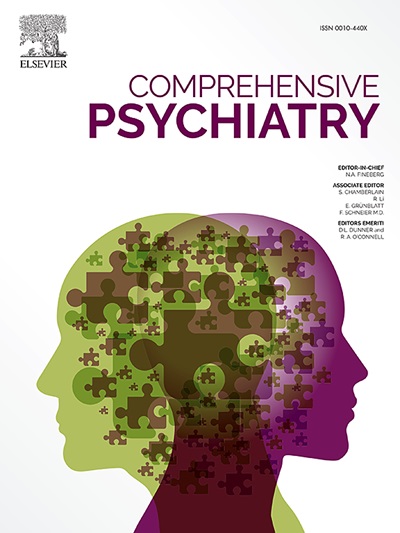Implementing the ‘Integrated Model for Supervision’ for mental health and psychosocial support programming within humanitarian emergencies: A mixed-methods evaluation across six humanitarian contexts
IF 4.2
2区 医学
Q1 PSYCHIATRY
引用次数: 0
Abstract
Background
The ‘Integrated Model for Supervision’ (IMS) offers important guidance for how to provide supportive supervision within mental health and psychosocial support (MHPSS) programming in humanitarian emergencies. The current study sought to (i) describe how the IMS was implemented following IMS training; (ii) assess whether delivery of the IMS training is associated with changes in a selection of theoretically supported quantitative outcomes; and (iii) elicit feedback on the IMS and its implementation process.
Methods
Data was collected from a participant pool of n = 119 individuals from six different humanitarian organisations that had previously participated in an IMS training. For the first and third objectives, interviews at 6- and 12-months post-training were conducted and thematically analysed. For the second objective, timepoint comparison analytical techniques were used across five distinct timepoints.
Results
Quantitative findings showed significant increases in participant self-efficacy, supervision knowledge, and supervision confidence, alongside some evidence of reductions in participant burnout. Qualitatively, participants underscored the IMS's efficacy in creating supportive supervision structures within their organisations, identified barriers and facilitators to implementation and proposed strategies for sustainability. Additionally, they highlighted positive impacts of implementing the IMS on staff, organisational culture, and service quality.
Discussion/conclusion
This study supports the effectiveness and acceptability of the IMS in enhancing the capacity of organisations to provide supportive supervision in humanitarian contexts, as key to promote the wellbeing of humanitarian MHPSS workers and the quality of the services they deliver. Challenges remain, however, to ensure sustainable implementation of the IMS, which guide ongoing efforts towards its improvement.

在人道主义紧急情况下实施精神卫生和社会心理支持方案的“综合监督模式”:在六种人道主义情况下进行混合方法评估
“综合监督模式”(IMS)为如何在人道主义紧急情况下的精神卫生和社会心理支持(MHPSS)规划中提供支持性监督提供了重要指导。目前的研究试图(i)描述在IMS培训后如何实施IMS;(ii)评估IMS培训的提供是否与一系列理论支持的定量结果的变化有关;(iii)征求对IMS及其实施过程的反馈意见。方法收集来自6个不同人道主义组织的n = 119名参与者的数据,这些人以前参加过IMS培训。为实现第一和第三个目标,在培训后6个月和12个月进行了面谈并进行了主题分析。对于第二个目标,在五个不同的时间点上使用了时间点比较分析技术。结果量化研究结果显示,参与者的自我效能感、监管知识和监管信心显著提高,同时有证据表明参与者的倦怠有所减少。从质量上讲,与会者强调了IMS在其组织内建立支持性监督结构方面的有效性,确定了实施的障碍和促进因素,并提出了可持续性战略。此外,他们强调了实施IMS对员工、组织文化和服务质量的积极影响。本研究支持IMS在提高组织在人道主义背景下提供支持性监督的能力方面的有效性和可接受性,这是促进人道主义MHPSS工作人员福祉和他们提供服务质量的关键。然而,在确保IMS的可持续实施方面仍然存在挑战,这将指导正在进行的改进IMS的努力。
本文章由计算机程序翻译,如有差异,请以英文原文为准。
求助全文
约1分钟内获得全文
求助全文
来源期刊

Comprehensive psychiatry
医学-精神病学
CiteScore
12.50
自引率
1.40%
发文量
64
审稿时长
29 days
期刊介绍:
"Comprehensive Psychiatry" is an open access, peer-reviewed journal dedicated to the field of psychiatry and mental health. Its primary mission is to share the latest advancements in knowledge to enhance patient care and deepen the understanding of mental illnesses. The journal is supported by a diverse team of international editors and peer reviewers, ensuring the publication of high-quality research with a strong focus on clinical relevance and the implications for psychopathology.
"Comprehensive Psychiatry" encourages authors to present their research in an accessible manner, facilitating engagement with clinicians, policymakers, and the broader public. By embracing an open access policy, the journal aims to maximize the global impact of its content, making it readily available to a wide audience and fostering scientific collaboration and public awareness beyond the traditional academic community. This approach is designed to promote a more inclusive and informed dialogue on mental health, contributing to the overall progress in the field.
 求助内容:
求助内容: 应助结果提醒方式:
应助结果提醒方式:


